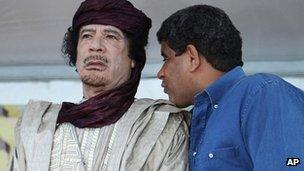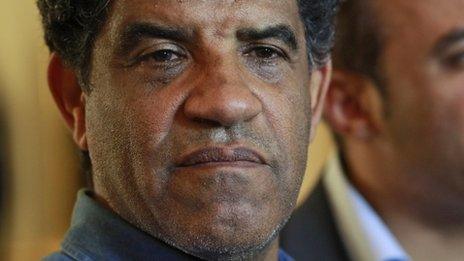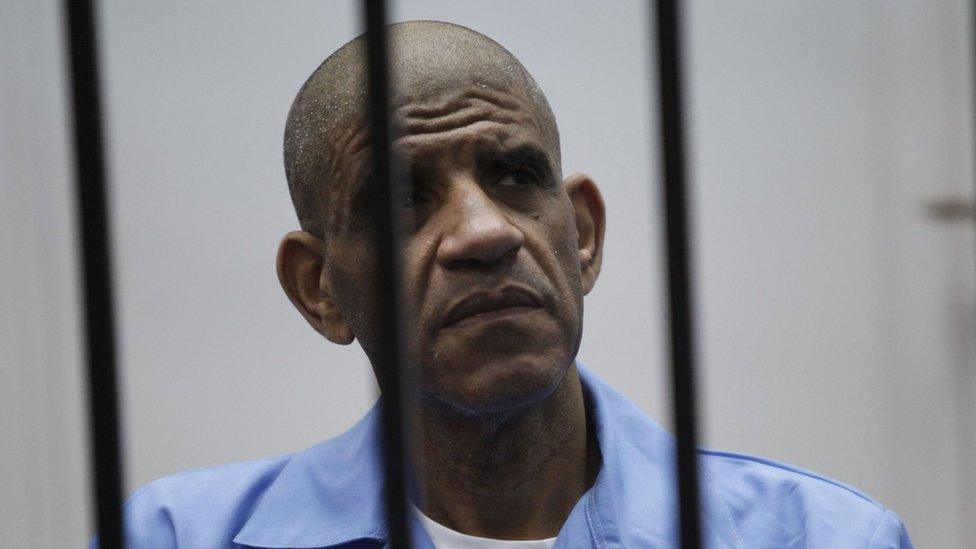Fair trial urged as spy boss Senussi deported to Libya
- Published
Video on social media appeared to show him stepping down from a helicopter
The US and human rights groups have called on Libya to give a fair trial to Col Gaddafi's ex-intelligence chief after he was deported by Mauritania.
The US said Abdullah al-Senussi must be tried "in full compliance with Libya's international obligations".
Libya's PM insisted Mr Senussi would face trial "according to international standards for human rights".
Mr Senussi, who is being held in Tripoli, fled Libya after last year's uprising against Col Muammar Gaddafi.
Mr Senussi is accused of crimes allegedly committed during Col Gaddafi's rule and is also wanted by France and the International Criminal Court.
'Rule of law'
Pictures on social media appeared to show Mr Senussi stepping down from a helicopter in Tripoli on Wednesday after news broke that Mauritania had agreed to deport him.
Mr Senussi was arrested on his arrival in Mauritania in March, sparking repeated requests to the west African nation from the Libyan government for his return.
"Abdullah al-Senussi will have a fair trial according to international standards for human rights, the rights from which Libyans were deprived," Prime Minister Abdurrahim el-Keib told reporters in Tripoli.
Acting US state department deputy spokesman Patrick Ventrell said: "The international community has been very clear that he should be held accountable for his actions.
"It will be critical that Libya take all necessary steps to ensure that he's held securely, treated humanely and tried fairly in full compliance with Libya's international obligations."
Geraldine Mattioli-Zeltner, of Human Rights Watch, said Mr Senussi must be treated humanely.
"The government should also abide by its international obligations to cooperate with the ICC. Such actions are crucial for Tripoli to demonstrate that Libya is in a new era marked by the rule of law," Ms Mattioli-Zeltner said.
A spokesman for Libya's attorney general said Mr Senussi had undergone a routine medical check-up and was in good health. He added that prosecutors would begin questioning him as soon as possible.
BBC Middle East editor Jeremy Bowen says a key question is what he might reveal about extraordinary rendition - the process under which jihadist enemies of Col Gaddafi's Libya were sent back to Libya by the US and Britain.
Mr Senussi's extradition to Libya is being seen as a blow for the ICC.
Not only has the court been trying to win custody of Mr Senussi, it is also arguing that Col Gaddafi's son Saif al-Islam should also be brought to justice at the court.
In June 2011, the ICC issued a warrant for Mr Senussi , externalfor crimes against humanity alleged to have been carried out in Benghazi, the main base of the Libyan opposition during the revolt last year.
France has already sentenced Mr Senussi to life imprisonment for his involvement in the bombing of a French airliner over Niger in 1989 in which 170 people were killed.
He has been accused of various human rights abuses including his alleged role in the 1996 massacre of more than 1,000 inmates at the Abu Salim prison in Tripoli.

Abdullah al-Senussi was one of Gaddafi's closest confidants
He is alleged to have ordered guards standing on grated ceilings above the inmates to fire down on them, after riots broke out over demands for better food and conditions.
Mr Senussi is also believed to have information about Libyans kidnapped and assassinated abroad during Gaddafi's rule, and the financing of terrorist organisations, especially in Africa.
Investigators in the US and UK believe he may have further knowledge about the 1988 airliner bombing over Lockerbie in Scotland in which 270 people died.
Earlier this year, US House Minority Leader Nancy Pelosi, who led a delegation to the region, said Washington had a "particular interest" in seeing Mr Senussi arrested "because of his role with the Lockerbie bombing".
- Published21 March 2012

- Published18 March 2012

- Published17 March 2012

- Published16 October 2015
